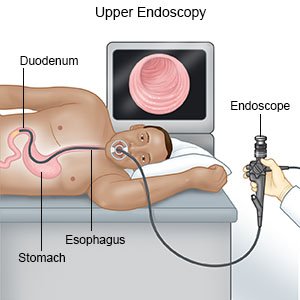Upper Endoscopy
Medically reviewed by Drugs.com. Last updated on Jun 5, 2024.
AMBULATORY CARE:
What you need to know about an upper endoscopy:
An upper endoscopy is also called an upper gastrointestinal (GI) endoscopy, or an esophagogastroduodenoscopy (EGD). A scope (thin, flexible tube with a light and camera) is used to examine the walls of your upper digestive tract. The upper digestive tract includes the esophagus, stomach, and duodenum (first part of the small intestine). An upper endoscopy is used to look for problems, such as bleeding, polyps, ulcers, or infection.
 |
How to prepare for an upper endoscopy:
Your healthcare provider will talk to you about how to prepare for your procedure. You may be told not eat or drink anything except water for 6 to 12 hours before the procedure. Your provider will tell you which medicines to take or not take on the day of your procedure. Arrange to have someone drive you home.
What will happen during an upper endoscopy:
- You will be given medicine through your IV to help you relax and make you drowsy. You will also be given medicine to numb your throat. You may need to wear a plastic mouthpiece to help hold your mouth open and protect your teeth and tongue. Your provider will gently insert the endoscope through your mouth and down into your throat. You may be asked to swallow to help move the scope. You may feel pressure in your throat, but you should not feel pain. The endoscope does not restrict your breathing.
- Your provider will watch the scope on a monitor and take pictures with the scope. Your provider may gently inject air to make it easier to see your digestive tract clearly. Your provider may take tissue samples and send them to a lab for tests. Foreign objects, tumors, or polyps that may be blocking your digestive tract may be removed. Your provider may also insert tools with the scope to treat bleeding or place a stent (tube).
What to expect after an upper endoscopy:
You may feel bloated, gassy, or have some abdominal discomfort. Your throat may be sore for 24 to 36 hours after the procedure. You may burp or pass gas from air that is still inside your body after your procedure. You may need to take short walks to help move the gas out. Eat small meals, if you feel bloated. Do not drive or make important decisions until the day after your procedure.
Risks of an upper endoscopy:
Your esophagus, stomach, or duodenum may be punctured or torn during the procedure. This is because of increased pressure as the scope and air are passing through. You may bleed more than expected or get an infection. You may have a slow or irregular heartbeat, or low blood pressure. This can cause sweating and fainting. Fluid may enter your lungs and you may have trouble breathing. These problems can be life-threatening.
Call 911 if:
- You have sudden chest pain or trouble breathing.
Seek care immediately if:
- You feel dizzy or faint.
- You have trouble swallowing.
- You have severe throat pain.
- Your bowel movements are very dark or black.
- Your abdomen is hard and firm and you have severe pain.
- You vomit blood.
Contact your healthcare provider if:
- You feel full or bloated and cannot burp or pass gas.
- You have not had a bowel movement for 3 days after your procedure.
- You have neck pain.
- You have a fever or chills.
- You have nausea or are vomiting.
- You have a rash or hives.
- You have questions or concerns about your endoscopy.
Relieve a sore throat:
Suck on throat lozenges or crushed ice. Gargle with a small amount of warm salt water. Mix 1 teaspoon of salt and 1 cup of warm water to make salt water.
Relieve gas and discomfort from bloating:
Lie on your right side with a heating pad on your abdomen. Take short walks to help pass gas. Eat small meals until bloating is relieved.
Rest after your procedure:
You have been given medicine to relax you. Do not drive or make important decisions until the day after your procedure. Return to your normal activity as directed. You can usually return to work the day after your procedure.
Follow up with your healthcare provider as directed:
Write down your questions so you remember to ask them during your visits.
© Copyright Merative 2024 Information is for End User's use only and may not be sold, redistributed or otherwise used for commercial purposes.
The above information is an educational aid only. It is not intended as medical advice for individual conditions or treatments. Talk to your doctor, nurse or pharmacist before following any medical regimen to see if it is safe and effective for you.
Further information
Always consult your healthcare provider to ensure the information displayed on this page applies to your personal circumstances.
